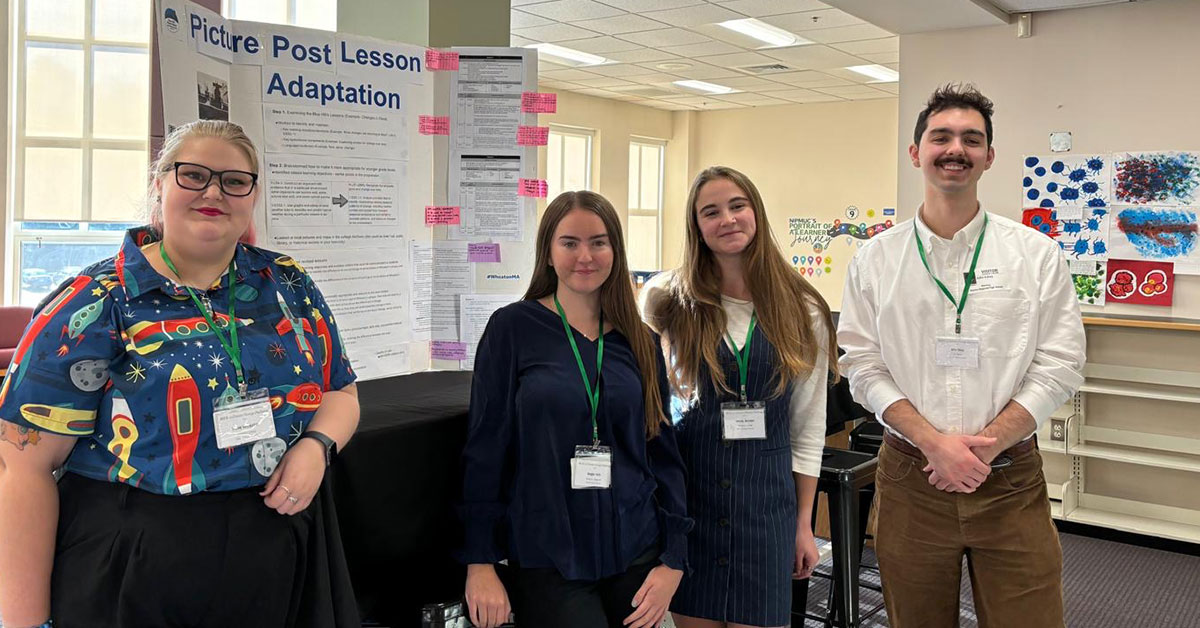Teaching to learn

Student project offered as an example for professional educators
Maeve McLaughlin ’26 and her classmates gained new insights into teaching from lesson plans that they wrote themselves.
Students enrolled in the course “Teaching Math and Science,” led by Assistant Professor of Education Sara Donaldson, adapted curricular materials on climate change developed for pre-teens and adolescents by the Blue Hills Observatory in Milton, Mass., into age-appropriate lessons for early elementary school students.
The students then presented the curriculum—and the process they followed to create it—to a regional conference of practicing teachers.
“We got this hands-on experience adapting existing lesson plans into something that meets the state’s educational standards for early elementary school students,” said McLaughlin, an elementary education major from Brooksville, Maine. “At the same time, we demonstrated how to use local information about the environment that would be more personally relevant to students than materials from a community that they may never have visited before.”
The project required substituting local information, including photographs, maps and records from the Wheaton College archives, for the pictures and weather observations from the Blue Hill Observatory and Science Center on the outskirts of Boston.
In addition, the translation included thinking through ways to make the lesson plans universally accessible, which requires consideration of learning differences and the varied communities in which students live and learn. For example, McLaughlin pointed out that a teacher-led nature walk might not work for students attending a school in the city or for students who use a wheelchair.
“We tried to think about how a teacher might do this if they were working in Boston or another city,” said McLaughlin, who brought her own experiences assisting in her rural Maine hometown school and observing lessons in the suburban Norton classroom led by Wheaton alumna Sarah Alves ’04. “How would they have a similar sort of experience in a different community context? And what would those students already know about life cycles and the seasons?”
The semester-long project developed through chance, Donaldson said. Darcy Daniels, the mother of one of the students in the class, was co-chairing the conference Massachusetts K–12 Climate Change Challenge. She offered an opportunity to get involved by revising the observatory’s curricular materials for younger students with local community resources. Although the semester had begun, Donaldson accepted the offer, deciding to change the students’ independent project assignments into a group effort.
“I introduced it to the students as an opportunity, and I told them that it was going to mean that we were going to have to adjust on the fly to complete the project successfully while also meeting the learning objectives for the course,” she said.
The fluid nature of the course also contained a lesson for the aspiring group of teachers. “It was a little messy at times, but they really stuck with it in a flexible way,” Donaldson said. “That’s exciting to see because flexibility is definitely a key attribute you need as a teacher, adjusting on the fly to the needs of the students in front of you.”
McLaughlin appreciated the practical orientation of the course as well as the flexibility built into the experience. “I really enjoyed the hands-on nature of the course, really focusing on the questions of ‘How would this work in the classroom? How would we use this with students?’ And it was great to end the course with the opportunity to share what we learned with elementary educators and get their feedback.”
